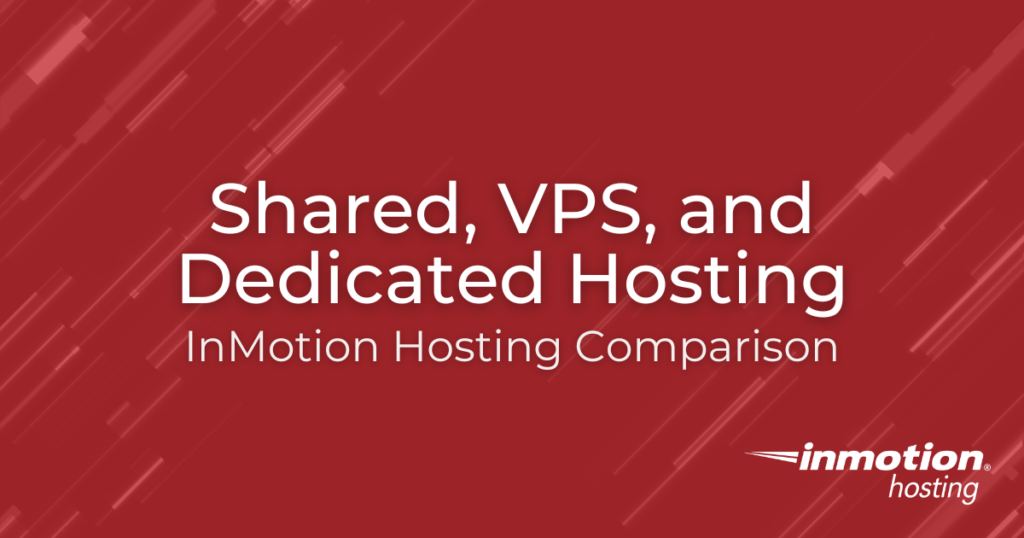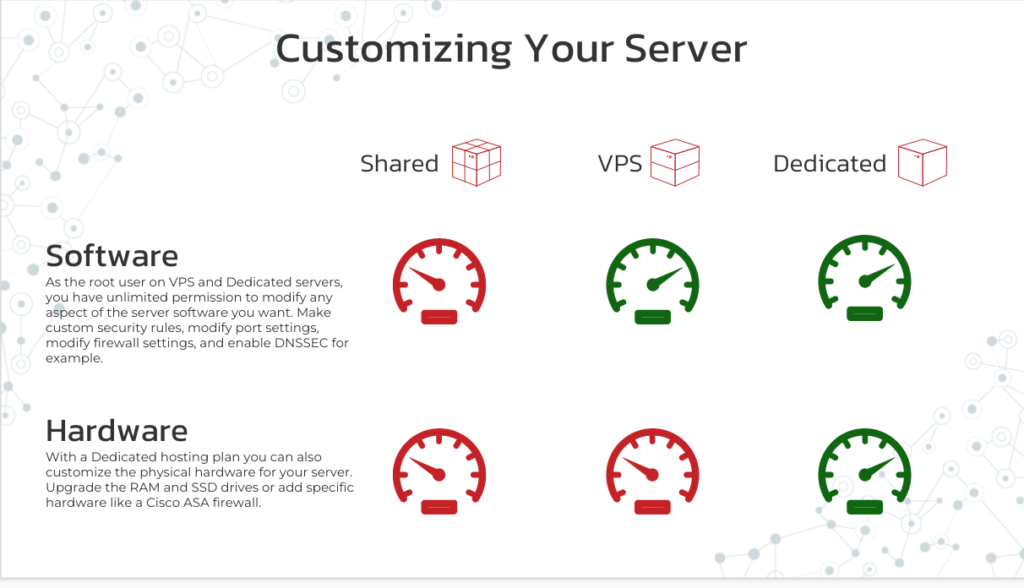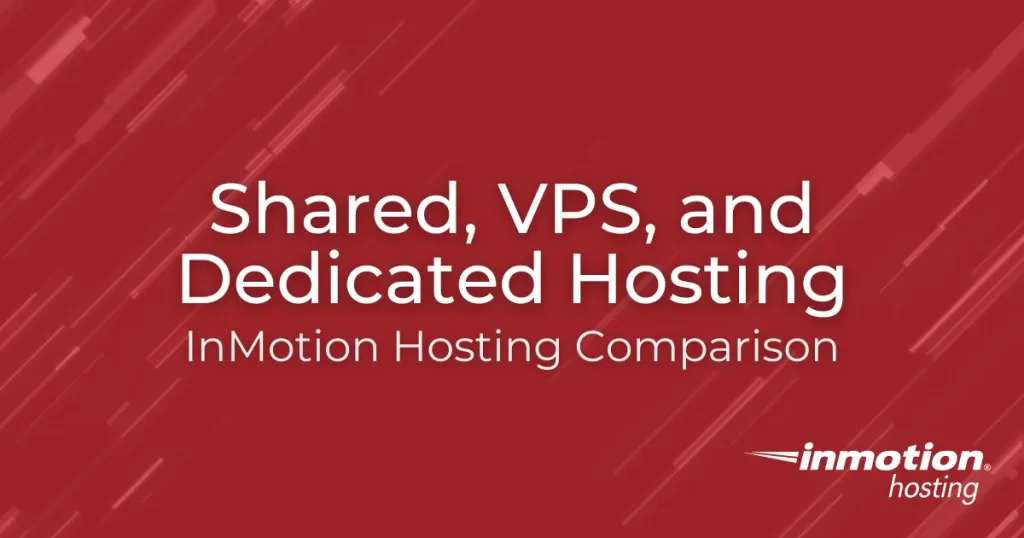
With the various types of web hosting available, it can be confusing to determine which one is right for you. Should you choose Shared Hosting, Managed VPS Hosting, or a Dedicated web hosting plan? You might be wondering what a VPS or Shared Hosting is.
In this guide, we will explain Shared, VPS, and Dedicated hosting plans, and highlight their differences so you can decide which is best for your needs.
Hosting Platform Analogies
Shared Hosting
Shared Hosting is similar to living in an apartment complex. All residents share the available resources, such as the pool, parking lot, and playground. In shared hosting, all accounts must share CPU time, memory, and disk space with other accounts on the server. Our System Administrators monitor all our shared servers 24/7.
Managed VPS Hosting
Managed VPS Hosting, including our VPS 2GB RAM, VPS 4GB RAM, VPS 6GB RAM, and VPS 8GB RAM plans, is akin to owning a condo. You share some property resources but are responsible for maintaining your property and making repairs. Fewer residents occupy each building.
On a Virtual Private Server (VPS), not all resources are shared. The overall CPU time and memory are shared across all accounts on the machine, but portions of those resources are dedicated to each account, offering more power and flexibility than a shared account.
Dedicated Hosting
Dedicated Hosting, including our Aspire, Essential, Advanced, and Elite Dedicated Server Hosting Plans, can be compared to owning a house. You have access to all the machine’s resources, and no other accounts reside on the machine.
Apartment Living to Condo Living
Shared accounts are suitable for most users, allowing you to host various applications (such as WordPress) and provide ample email accounts. If you compare Shared Hosting to apartment living, an upgrade might be necessary if:
- A growing family: If your family outgrows the apartment, it may be time to upgrade. Similarly, if your website becomes popular, you may need to upgrade to Managed VPS Hosting for more CPU and memory to handle the increased traffic.
- Customizations: If you want to personalize your space, such as painting your walls red, moving to a condo provides more ownership and flexibility. If you require software not available in Shared Hosting, upgrading to Managed VPS Hosting allows you to install any software you need.
Condo Living to Single Family Home Living
While you have a lot of control in a condo, you don’t have complete control. There are many reasons a condo may have been great initially, but as your family and activities grow, you may opt for a single-family home, providing ample parking and extra bathrooms.
Managed VPS Servers are ideal for mid-sized businesses, offering a virtualized private server that you can configure to your liking. However, a Managed VPS Server is not a Dedicated Server, as you share the server with other users, and your actions could impact them. For example, a busy website dominating the server’s CPU memory and processing time could affect other users’ performance.
Shared Hosting vs Dedicated Hosting
Several factors impact the cost and value of Dedicated Hosting compared to Shared Hosting. Here are some key differences:
Server Performance
Shared hosting shares resources across all users, which can lead to a “noisy neighbors” situation, affecting your hosting experience. In contrast, a dedicated server offers faster response times and greater reliability, as its resources are exclusively yours.
For example, InMotion’s most affordable Dedicated Server includes a 3.50GHz Turbo Xeon processor, 16GB of DDR4 RAM, 1TB SSD, and 8MB of CPU Cache per account. This means your resource usage alone determines performance, not other users.
Customization
Shared hosting services limit the software installed by multiple users to prevent security risks and server-wide issues from broken scripts. On the plus side, less customization means an easier learning curve.
A dedicated server offers more room for customization. You can install optimized software to meet your company and customer requirements without restrictions or impacting other websites. With root access, you have unlimited permission to modify any aspect of the server to suit your needs.

Server Security
If another user on your shared server experiences a hack, it can degrade the server’s performance, affecting all sites hosted on it. Your site’s security could be compromised, particularly if it processes financial transactions or stores private customer information.
With a dedicated server, you don’t have to worry about other users compromising the entire server. You can enhance security by installing hardware and software firewalls and powerful security tools requiring root-level access, which isn’t available on shared hosting platforms. For example, you can modify port settings, create custom firewall rules, or configure DNSSEC.
VPS Hosting vs. Dedicated Hosting
Although VPS hosting and dedicated server hosting have many subtle differences, here are a few key examples of how they differ:
Speed
Users on VPS platforms share the same physical hardware but operate within discrete virtual environments, accessing only a fraction of the total system resources. Dedicated hosting, on the other hand, allocates all system resources to the user by default, improving page load times and website responsiveness. Faster page loads increase the likelihood that visitors will stay on your site.
Price
Generally, VPS hosting is more affordable than any dedicated plan due to its shared nature, which is crucial to consider for your web hosting budget. Conversely, dedicated hosting can be more expensive due to hardware and data center operation costs, making it ideal for large-scale applications like eCommerce businesses.
Scalability
A VPS often offers superior scalability for expanding your site or increasing storage. Since VPS platforms are managed virtually, upgrading storage can be done by allocating additional resources from the existing memory pool. With dedicated hosting, you need to physically add extra drives to the server, which costs money and time and can cause site downtime during installation.
Still unsure if dedicated hosting is right for you? Learn more about dedicated hosting uses, the importance of data center location, and what to consider when upgrading to dedicated hosting.
Security
Hosting companies rarely advertise their security measures to avoid attracting malicious attention. However, shared servers, VPS, and dedicated server hosting each have different security measures. Security also involves backups and recovery. InMotion Hosting provides these services through hosting software or paid services for VPS and shared server accounts. Dedicated server accounts using cPanel offer Backup Manager with larger storage spaces due to their configuration and cost.
Managed plans for all three types of hosting allow users to employ InMotion Hosting support for hardware management. There are also unmanaged solutions for those who want complete control over their server access.
Enjoy high-performance, lightning-fast servers with enhanced security and maximum uptime with our Managed VPS Hosting!
Shared and Dedicated IP Addresses
An IP address is a unique number associated with a website, computer, or other internet-connected device, allowing it to receive and transmit data online. A shared IP address means multiple accounts use the same IP on a server, while a dedicated IP address provides exclusive use of a particular IP.
Shared IP addresses are cost-effective. Using a dedicated IP address simplifies certain aspects of site management and email administration. Generally, all shared hosting accounts use shared IP addresses, while VPS, Cloud, and Dedicated Hosting accounts come with a set number of dedicated IP addresses. You can purchase additional dedicated IP addresses within the Account Management Panel (AMP) if needed.
- Shared Hosting & Managed Shared WordPress Hosting: Shared IP, with the option to buy a dedicated IP.
- Managed VPS Hosting, Cloud Hosting Reseller, & Cloud Business Solutions: 3 dedicated IPs, with the option to buy more.
- Managed Dedicated Hosting & Bare Metal Servers: 5 to 15 dedicated IPs, depending on the plan, with the option to buy more.
